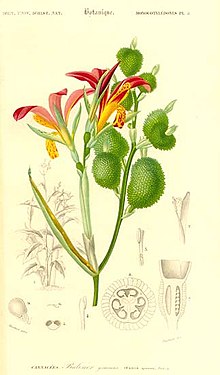This is an old revision of this page, as edited by Giantsshoulders (talk | contribs) at 16:46, 7 January 2007 (Original). The present address (URL) is a permanent link to this revision, which may differ significantly from the current revision.
Revision as of 16:46, 7 January 2007 by Giantsshoulders (talk | contribs) (Original)(diff) ← Previous revision | Latest revision (diff) | Newer revision → (diff)
| Canna speciosa | |
|---|---|

| |
| Scientific classification | |
| Kingdom: | Plantae |
| Division: | Magnoliophyta |
| Class: | Liliopsida |
| Order: | Zingiberales |
| Family: | Cannaceae |
| Genus: | Canna |
| Species: | C. speciosa |
| Binomial name | |
| Canna speciosa Sims. | |
Canna speciosa is a species of the Canna genus, belonging to the family Cannaceae, a native of the Caribbean and tropical Americas. Introduced to England from South America in 1820, speciosa meaning 'showy'. (Johnson's Gardeners Dictionary, 1856).
It is a perennial growing to 2m. It is hardy to zone 10 and is frost tender. In the north latitudes it is in flower from August to October, and the seeds ripen in October. The flowers are hermaphrodite.
Taxonomy
In the last three decades of the 20th century, Canna species have been categorised by two different taxonomists, Professor Paul Maas (and his wife Dr. Hiltje Maas) from Holland and Dr. Nobuyuki Tanaka from Japan. Inevitably, there are differences in their categorisations.
Dr Maas considers this to be a synonym of C. indica L., however, Dr Tanaka's studies have revealed that a DNA assay demonstrates that the C. indica complex can be clearly distinguished from other taxa, as a result he recognises this as a separate species.
Canna speciosa, Sims.
A tall, slender plant with an upright stem clad up its entire length with fairly large, stalkless, gracefully arching leaves, it bears heads of rather exotic, bi-colored flowers with scarlet petals and a conspicuous contrasting yellow throat.
References
- Johnson's Gardeners Dictionary, 1856